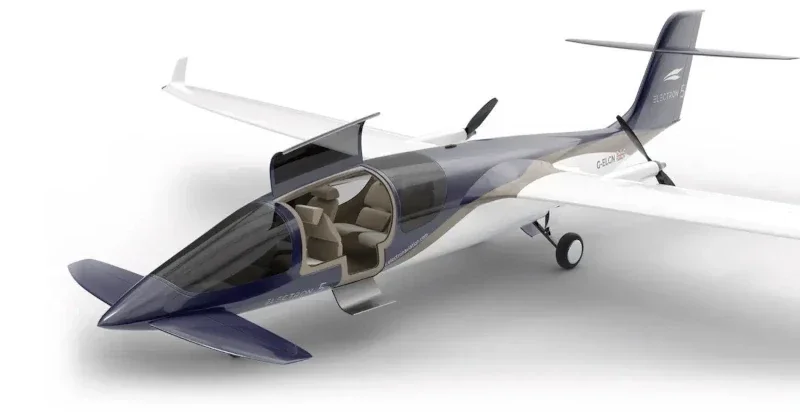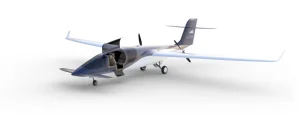- Directory
- Electrified Aircraft
- All-Electric Aircraft
- All Electric Conventional
- ELECTRON aerospace Electron 5

ELECTRON aerospace Electron 5
Hot
2676 0 4 0
Operational Information
Overview:
The Electron 5 is a compact, efficient electric aircraft that emphasizes sustainability and accessibility in urban environments. Its design focuses on reducing urban congestion and providing a green alternative to traditional modes of transportation. It's part of a growing trend to incorporate electric power in aviation, aiming to decrease carbon emissions and noise pollution.
Aircraft type:
Aircraft Model
Electron 5
Manufacturer
ELECTRON aerospace
Country
Netherlands.
Crew
- Piloted
Propulsion
- Pusher Propeller
Enter service date.
2027
Website
https://flyelectron.eu/
Performance and Capacity
Propellers:
- 2 Pusher propellers
Motors
- Brushless DC electric motor (BLDC)
Power source:
- Battery
Passenger Capacity
3
Range
500 km + 250 km safety reserves
Cruise speed
250 km/h at 10,000 ft
Noise at cruise
< 55dB
Payload
500 kg cargo payload on standard Euro palette (1200 x 800)
Take off distance
600 m short-field takeoff distance
The Electron 5 is a compact, efficient, all-electric aircraft that emphasizes sustainability and accessibility in urban environments. Its design focuses on reducing urban congestion and providing a green alternative to traditional modes of transportation. It's part of a growing trend to incorporate electric power in aviation to decrease carbon emissions and noise pollution.
Development:
The Electron 5 is a high-performing aircraft, boasting a cruise speed of 250 km/h at an altitude of 10,000 feet and a range that exceeds 750 km. It demonstrates its energy efficiency by using 67 Wh per passenger kilometer, occupying three-quarters of the seats. The aircraft is designed for short takeoff distances, requiring only 600 meters. It also offers a comfortable passenger experience with expansive windows, USB ports, foldable tables, and luxury seating.
The Electron 5 is a high-performing aircraft, boasting a cruise speed of 250 km/h at an altitude of 10,000 feet and a range that exceeds 750 km. It demonstrates its energy efficiency by using 67 Wh per passenger kilometer, occupying three-quarters of the seats. The aircraft is designed for short takeoff distances, requiring only 600 meters. It also offers a comfortable passenger experience with expansive windows, USB ports, foldable tables, and luxury seating.
Several innovative aircraft models are making significant strides in the eVTOL market's competitive landscape. The Electron 5, developed by Electron Aerospace, distinguishes itself with its dual passenger and cargo transport functionality. This aircraft leverages emission-free technology and a noise-efficient design that complies with stringent environmental standards, allowing nighttime operations.
Electron Aerospace is committed to leading the charge in sustainable aviation with the Electron 5. The aircraft is designed to accommodate a standard Euro pallet through its dual passenger and cargo door, enhancing its functionality in cargo operations. Its design draws inspiration from nature and emphasizes sustainability while optimizing safety and performance standards. Participation in the AZEA Programme illustrates the company's commitment to integrating electric aircraft into commercial service by 2050.
Competing in this space, Lilium GmbH, a German company, has developed the Lilium Jet. This five-seater eVTOL aircraft is gearing up to commence commercial operations and is establishing partnerships for on-demand air taxi services, which could reshape urban mobility.
Adding to the variety in the eVTOL market is the Sirius Business Jet by Sirius Aviation. This jet, a leader in the hydrogen-powered VTOL segment, offers impressive specifications such as an 1150-mile flight range, a cruising speed of 323 mph, and an operating altitude of up to 30,000 feet. It stands out for its ultra-quiet operations and the hybrid functionality of both airplanes and helicopters, catering efficiently to three passengers.
The Horizon Cavorite X7, a hybrid aircraft capable of traditional and VTOL flight, caters to passenger and cargo needs. It incorporates a unique fan-in-wing technology, which enhances its operation efficiency and reduces noise, making it especially suitable for urban air mobility contexts. The X7 aims to carry up to five passengers or an equivalent cargo load across distances up to 250 miles.
These aircraft not only push the boundaries of technology in their respective niches—Sirius with its focus on hydrogen power for high performance and sustainability, and Horizon with its hybrid technology for versatility—but also collectively drive the evolution of urban and regional transportation solutions in the eVTOL market.
Here's a table comparing the key features of the Feature Electron 5, Lilium Jet, Sirus Business Jet, and the Horizon Cavorite X7
FeatureElectron 5Lilium JetSirius Business JetHorizon Cavorite X7
| Company | Type | Passenger Capacity | Flight Range | Cruise Speed | Operating Altitude | Noise Level | Technological Focus | Environmental Impact | Market Role |
|---|---|---|---|---|---|---|---|---|---|
| Electron Aerospace | eVTOL | Dual passenger and cargo transport | - | - | - | Noise-efficient, suitable for night operation | Emission-free technology | Meets strict environmental standards | Urban and regional transport |
| Lilium GmbH | eVTOL | Five passengers | - | - | - | - | On-demand air taxi services | - | Urban air mobility |
| Sirius Aviation | Hydrogen-powered VTOL | Three passengers | 1150 miles | 323 mph | Up to 30,000 feet | Ultra-quiet, 60dBa | Combines airplane and helicopter functionalities | Hydrogen power for sustainability | High-performance, sustainable aviation |
| Horizon Aircraft | Hybrid VTOL | Up to five passengers or equivalent cargo | 250 miles | - | - | Engineered for minimal noise | Fan-in-wing technology for efficient operation | High efficiency and sustainability | Urban air mobility solutions |
This comparison table highlights how each aircraft is positioned in terms of passenger capacity,
Development Progress and Future Outlook Electron Aerospace continues to push forward in the development of the Electron 5, with milestones like the Electron Hangar Day demonstrating the aircraft's advancements and potential. The planned circumnavigation flight in 2027 will further prove its capabilities and reliability. Electron Aerospace aims to solidify the Electron 5's role in reshaping regional air mobility.
Conclusion The Electron 5 is set to significantly influence urban air mobility, offering a sustainable, efficient, and versatile solution. Through continued innovation and a commitment to environmental stewardship, it is set to redefine regional air transportation.




